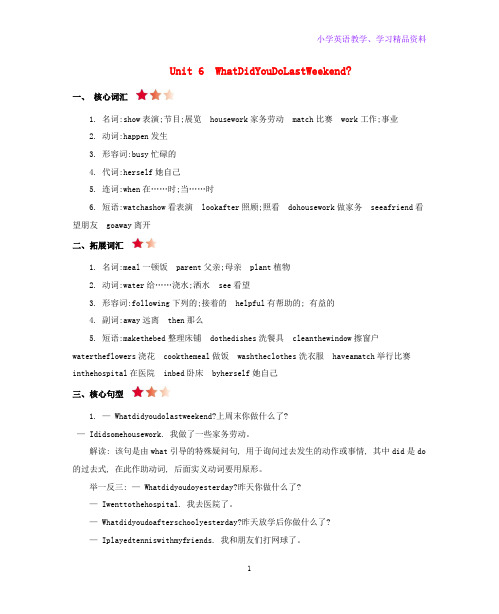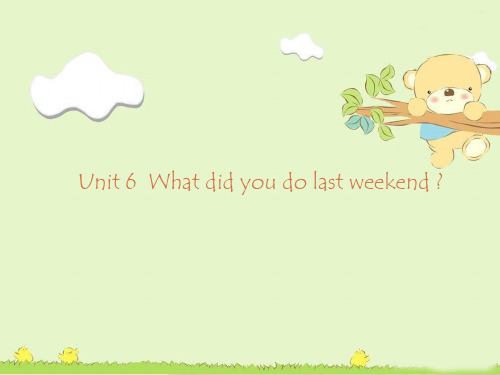陕旅版六年级英语上册Unit_6__What_did_you_do_last_weekend
- 格式:ppt
- 大小:1.58 MB
- 文档页数:12


Unit 6 WhatDidYouDoLastWeekend?一、核心词汇1. 名词:show表演;节目;展览housework家务劳动match比赛work工作;事业2. 动词:happen发生3. 形容词:busy忙碌的4. 代词:herself她自己5. 连词:when在……时;当……时6. 短语:watchashow看表演lookafter照顾;照看dohousework做家务seeafriend看望朋友goaway离开二、拓展词汇1. 名词:meal一顿饭parent父亲;母亲plant植物2. 动词:water给……浇水;洒水see看望3. 形容词:following下列的;接着的helpful有帮助的; 有益的4. 副词:away远离then那么5. 短语:makethebed整理床铺dothedishes洗餐具cleanthewindow擦窗户watertheflowers浇花cookthemeal做饭washtheclothes洗衣服haveamatch举行比赛inthehospital在医院inbed卧床byherself她自己三、核心句型1. — Whatdidyoudolastweekend?上周末你做什么了?— Ididsomehousework. 我做了一些家务劳动。
解读: 该句是由what引导的特殊疑问句, 用于询问过去发生的动作或事情, 其中did是do 的过去式, 在此作助动词, 后面实义动词要用原形。
举一反三: — Whatdidyoudoyesterday?昨天你做什么了?— Iwenttothehospital. 我去医院了。
— Whatdidyoudoafterschoolyesterday?昨天放学后你做什么了?— Iplayedtenniswithmyfriends. 我和朋友们打网球了。
2. — Whathappenedtoher?她发生了什么事?— Whenshewas8yearsold,hermotherwasillinbed. 当她8岁的时候, 她的妈妈生病在床。


Unit 6课文翻译What Did You Do Last Weekend? 上个周末你做了什么?A 部分Look and tick看一看,勾选Are you helpful at home?你在家帮忙吗?Are you helpful at home?你在家帮忙吗?Yes, I am.是的。
What do you often do?你经常做什么?I often do the dishes.我经常洗碗。
Let's learn一起来学习Hi, Li Shan!嗨,李姗!What did you do last weekend?上周末你做了什么?I did some housework.我做了一些家务。
I cleaned the rooms,我打扫了房间、washed the clothes洗了衣服and cooked dinner.还做了饭。
What did your parents do then?你爸妈做了什么?They were busy.他们非常忙。
My father had some work to do.我爸爸有一些工作要做。
He went away from home early in the morning.他早上很早就出门了。
What did your mother do?你妈妈做了什么?She was in the hospital.她在医院。
My grandma was ill我奶奶生病了,and my motherlooked after her there.我妈妈在那儿照顾她。
I'm sorry to hear that.我很抱歉听到这个消息。
It doesn't matter.没关系。
She is better now.她现在好多了。
What did you do, then?你做了什么?I went to see some friends我去看望了一些朋友,and we had a football match.我们进行了一场足球比赛。


Unit6 What Did You Do Last Weekend?一、单元单词(13个)·show[ʃəʊ] / n.表演;节目;展览Show me which one you like and I'll buy it for you.(指给我看你喜欢哪个,我给你买。
)·watch a show/ 看表演I watch a live show of a concert.(我看了一个音乐会实况。
)·look after[luk ˈɑ:ftə] / 照顾;照看It makes sense to look after yourself.(自己应该照顾自己。
) ·housework[ˈhaʊswɜ:k] / n.家务劳动Modern inventions facilitate housework.(许多现代发明便利了家务劳动。
) ·do housework[du: ˈhauswə:k] / vt.做家务I often do housework.(我常做家务。
)·see a friend/ 看望朋友I went to see a friend of mine.(我去见我的一个朋友了。
)·match[mætʃ] / n.比赛He struck a match.(他划了一根火柴。
)·go away[ɡəu əˈwei] / vi.离开Don't go away.(别走了。
)·busy[ˈbɪzi] / adj.忙碌的What a busy day.(多么忙碌的一天啊。
)·work[wɜ:k] / n.工作;事业I love my job,so I work very hard.(我热爱我的工作,所以我工作很努力。
) ·happen[ˈhæpən] / vi.发生This is never to happen again.(再也不会发生这样的事了。
Unit6 单元目标一、单元总目标第五单元学习了be动词的过去式,本单元在上一单元的根底上,学习使用行为动词的过去式谈论过去的活动。
话题以日常活动为主要内容,使功能结构What did you do last weekend I did ... / What happened to her 对过去的活动进行描述并在日常生活情境中进行交流和使用。
本单元分为4个课时。
第一课时以Part A中Let’s learn局部的短语教学为主,学习掌握周末活动的表达方式;第二课时以Part A中Let’s talk局部的会话为主要内容,学习使用功能结构What did you do last week询问过去的活动,重点练习行为动词过去式的正确表达,难点为过去时态中助动词的使用;第三课时以Part B中Let’s learn more局部的对话为主,学习使用一般过去时态描述更多过去的活动;第四课时主要通过完成检测活动对本单元所学知识进行复习和稳固。
具体课时分配情况见下表:二、单元具体目标在第6单元的教学中,教师要借助身体语言、肢体动作以及丰富的教学资源,如卡片、挂图和多媒体,帮助学生理解和掌握如何用行为动词的过去式描述过去某时的动作行为,并能到达以下知识目标和情感目标:知识目标一、能听、说、读、写以下词汇:watch a show, look after, do housework, see a friend, have a match, go away, busy, work, happen, herself二、能听懂、会说、会读、会用以下句型:1. —What did you do last weekend—I did some housework. I cleaned the rooms,...2. —What happened to her—When she was 8 years old, her mother...3. —Did she...—Yes, she did. / No, she didn’t.4. I’m sorry to hear that.情感目标一、激发学生勇于探索,敢于表达的学习热情和劲头。